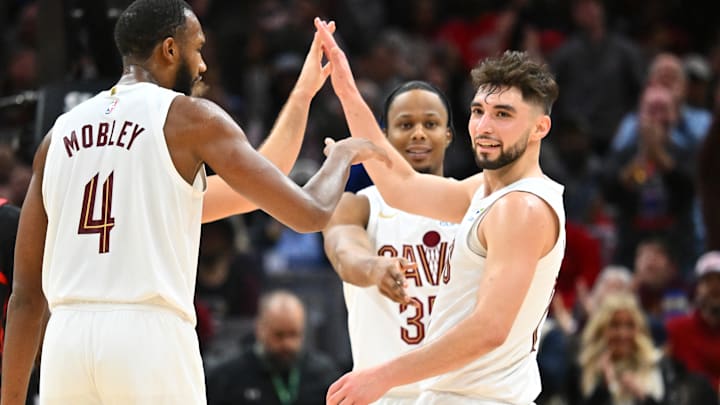Evan Mobley winning the NBA's 2024-25 Defensive Player of the Year award is objectively cool, and totally deserved. It is also going to be expensive for the Cleveland Cavaliers—so much so, it could force them to make material roster changes this summer.
Prior to the start of this season, Mobley signed a five-year, $224.9 million max extension. It was the standard 25 percent rookie-scale max. But it included language that drives the value to 30 percent of the salary cap if he won, among other things, Defensive Player of the Year. Now that his DPOY victory is official, Mobley's total contract value rises by roughly $45 million, to $269.1 million.
Cleveland will happily foot this bill. Not only is Mobley among the league's most impactful defenders, but he has made a ton of strides on the offensive end, putting himself into position to make First or Second Team All-NBA, something the Cavs have never seen from someone so young other than LeBron James himself.
Still, the financial fallout from Mobley’s pay-grade bump is real. And while the increase should not prompt Cleveland to bust up its core in the immediate future, it does leave them at greater risk of losing this season’s secret weapon.
Cleveland's biggest x-factor is due for a huge raise
Ty Jerome is the x-factor in question. After finishing near the top of the ballot in Sixth Man of the Year voting, on the back of ridiculous offensive output, the 27-year-old will enter 2025 free agency speeding toward a massive raise from his current $2.6 million.
First, the good news: The Cavs do not have cap space, but they do own Jerome’s Early Bird rights. This means they can offer him a starting salary in 2025-26 worth 175 percent of his current pay grade, or 105 percent of the NBA’s average salary.
A 175 percent bump from $2.6 million amounts to under $4.6 million, so that’s out of the question. But the Association’s average annual salary, while not yet finalized, typically checks in around the non-taxpayer mid-level exception. Next year’s bigger MLE is slated to come in at $14.1 million. If we play things ultra-conservatively, Cleveland will be able to offer Jerome a Year 1 salary north of $12.5 million.
Even if other teams are prepared to peddle the full non-taxpayer MLE, this gives the Cavs a chance to field a competitive offer. They can even pitch him on signing a short-term deal that gets him back into free agency next summer, at which point they can use his full Bird rights to give him more money.
But this presumes Cleveland can afford it. And that’s where things get thorny.
Mobley's DPOY victory makes re-signing Jerome even more prohibitive
Winning Defensive Player of the Year brings Mobley's 2025-26 salary from $38.7 million to $46.4 million. That difference of $7.7 million leaves the Cavs around $30 million into the luxury tax, and more than $12 million into the second apron.
This is all before they factor in any contract for Jerome. Even if he costs only $10 million per year to re-sign, they will be neck deep into second-apron territory.
Calling for ownership to shell out the money in the name of keeping a championship contender intact is perfectly fair. And given the lengths Cleveland went to duck the luxury tax altogether at the trade deadline—while still improving the roster, mind you—it seems as if the front office was preparing for this exact scenario. The Cavs may be perfectly okay bankrolling a mega-expensive nucleus through 2025-26, if not for longer.
At the same time, this isn't just about the money. Ending up in the second apron severely restricts the types of transactions Cleveland can make. It will no longer be able to aggregate salaries in trades, or have any version of the mid-level exception to pay free agents. It limits who they can scoop up off the buyout market midseason. Most notably, it prevents them from trading their first-round pick seven years into the future. In this case, that would be their 2032 selection.
The Cavs may decide Jerome is worth the extra complexities. After all, even without him on the books, they still profile as a second-apron team next season. But that ultimately adds even more intrigue to the equation.
If Cleveland doesn't want to be a second-apron team in the first place, escaping it will require letting Jerome walk and dumping more salary from the rotation. And in the event the Cavs are just willing to pay Jerome, it doesn't guarantee they won't offload salary elsewhere. Any one of Isaac Okoro, Dean Wade, De'Andre Hunter, or less likely, Max Strus could also become cap casualties depending on Cleveland's stomach for second-apron expenses and restrictions.
This is all to say: Re-signing Jerome this offseason was never a given. But Mobley's (well-earned) DPOY victory just made it a lot harder, if not even more unlikely.
Dan Favale is a Senior NBA Contributor for FanSided and National NBA Writer for Bleacher Report. Follow him on Bluesky (@danfavale), and subscribe to the Hardwood Knocks podcast, co-hosted by Bleacher Report's Grant Hughes.
